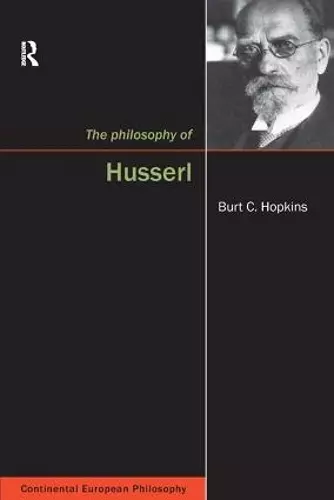The Philosophy of Husserl
Format:Paperback
Publisher:Taylor & Francis Ltd
Published:1st Dec '08
Currently unavailable, and unfortunately no date known when it will be back
This paperback is available in another edition too:
- Hardback£145.00(9781844650101)

As the founder of phenomenology, Edmund Husserl has been hugely influential in the development of contemporary continental philosophy. In The Philosophy of Husserl, Burt Hopkins shows that the unity of Husserl’s philosophical enterprise is found in the investigation of the origins of cognition, being, meaning, and ultimately philosophy itself. Hopkins challenges the prevailing view that Husserl’s late turn to history is inconsistent with his earlier attempts to establish phenomenology as a pure science and also the view of Heidegger and Derrida, that the limits of transcendental phenomenology are historically driven by ancient Greek philosophy.
Part 1 presents Plato’s written and unwritten theories of eidê and Aristotle’s criticism of both. Part 2 traces Husserl’s early investigations into the formation of mathematical and logical concepts and charts the critical necessity that leads from descriptive psychology to transcendentally pure phenomenology. Part 3 investigates the movement of Husserl’s phenomenology of transcendental consciousness to that of monadological intersubjectivity. Part 4 presents the final stage of the development of Husserl’s thought, which situates monadological intersubjectivity within the context of the historical a priori constitutive of all meaning. Part 5 exposes the unwarranted historical presuppositions that guide Heidegger’s fundamental ontological and Derrida’s deconstructive criticisms of Husserl’s transcendental phenomenology.
The Philosophy of Husserl will be required reading for all students of phenomenology.
Winner: Edward Goodwin Ballard Book Prize in Phenomenology, Center for Advanced Research in Phenomenology (2011)
"The only way to understand the importance of this book is to read it - and it definitely deserves to be read. … Hopkins’ work combines a rare originality with a profound philosophical sensibility and does so in a manner that defies easy summary and synopsis." - Claudio Majolino, Research in Phenomenology
"…Hopkins skillfully defends Husserl’s transcendental phenomenology from some of the most forceful and well-known criticisms of it, specifically those leveled by Heidegger and Derrida. … Hopkins’s book provides, among a vast array of other challenging and original claims and arguments, an exceptionally sophisticated and informed analysis…" - Walter Hopp, Husserl Studies
"… an expert and wide‑ranging account of the thought in question … a reader who is not satisfied with the clichés that have for so long dominated discussion of Husserl’s thought - whether that reader is a beginner or not - can do no better than get to know Hopkins’s book." - Steven Crowell, The New Yearbook for Phenomenology and Phenomenological Philosophy
"Overall this is a book well worth studying. ... It sheds much new light on how we are meant to understand the nature and status of ideal objects. ... Hopkins provides an innovative and detailed reading of Plato and Aristotle's notion of eidos and thereby invites us to reassess how we are to understand eidetic seeing and, indeed, the nature and purpose of philosophy. … [H]is innovative approach makes room for debate and breathes new life into Husserl's thought." - Lilian Alweiss, Notre Dame Philosophical Reviews
"A significant contribution to our understanding of Husserl, one that offers an original and challenging approach. A ground-breaking and important book." - Dermot Moran, University College Dublin, Ireland
ISBN: 9781844650118
Dimensions: unknown
Weight: 453g
290 pages